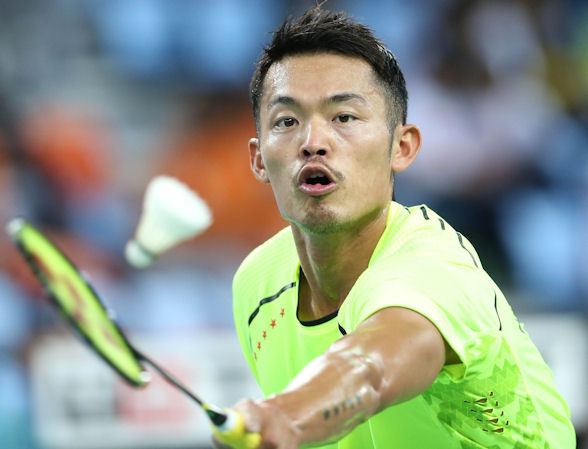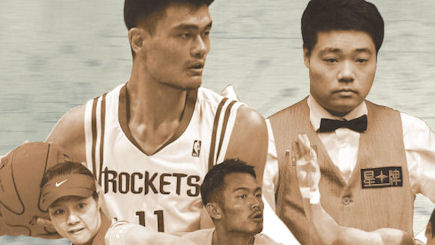This article first appeared in the May/Jun 2015 issue of WGM.
When you boast a population of almost 1.4 billion people – more than any other country on the planet – it stands to reason that at least a few of them will excel on the global stage. Well over 2,000 years ago, Chinese pioneers were inventing the world’s very first printing presses and can be credited with developing the basic paper making process still used today.

They were clever enough to recognize that certain minerals reacted to the earth’s magnetic fields which led to the invention of the compass, while to this day Chinese students continue to outperform their international peers in academic performance studies.
Similar dominance in the sporting field has taken longer to be realized but those wings keep spreading. When China returned to Olympic competition in 1984 after a 32 year absence, it immediately finished fourth on the medal tally and by the 2008 Beijing Olympics had finished in top spot for the first time with 51 gold and 100 medals overall.
While many of these came in sports such as table tennis, badminton, diving and gymnastics – those with a traditionally Asian powerbase – we’ve also seen an elite few Chinese athletes making waves elsewhere. From tennis to the NBA and the English Premier League, their success got us thinking about the growing list of Chinese athletes doing their country proud and which ones we consider to be the most significant of all. Here is our list of the five greatest Chinese athletes of all time.
#5 Lin Dan
Badminton has long been one of China’s favorite sports, as evidenced by the nation’s record 38 Olympic medals – 16 of them gold – since it became a full Olympic sport in 1992. With so much success over the past few decades, it takes a special talent to stand out from the crowd yet that’s exactly what Lin Dan has done. Regarded by many as the greatest singles player of all time, Lin remains the only player in history to have completed the so-called “Super Grand Slam” by winning the nine major badminton titles – Olympic gold, the World Championships, World Cup, Thomas Cup, Sudirman Cup, Super Series Masters Finals, All England Open, Asian Games and the Asian Championships.

His impressive list of accomplishments includes consecutive Olympic gold medals in men’s singles in 2008 and 2012 – again the only man to do so – as well as five World Championships and five All-England titles. Even his much-hyped rivalry with Malaysia’s Lee Chong Wei has in reality been a one-sided affair with Lin boasting a dominant 22-9 record – despite Lee having held the world number one ranking for most of the past six years. If anything, their clashes have been the greatest showpiece for Lin’s brilliance, with the Chinese star winning six of the 10 times they’ve met in BWF Superseries finals. More importantly, Lee’s two Olympic finals and two of his three World Championships finals have seen him play and lose to Lin.
Now 31, Lin isn’t done just yet either. An extended break from the sport combined with a bad run with injury has seen him play only a handful of tournaments each year since London 2012, but he has confirmed his intention to go for a third straight gold at the 2016 Rio Olympics. Now that would be an achievement!
#4 Ding Junhui
It might sound somewhat excessive to compare Ding Junhui to the likes of basketball legend Michael Jordan or boxing’s Muhammad Ali, but just as these legendary icons revolutionized their chosen sports, so too Ding has almost single-handedly reshaped the snooker landscape.
His achievements on the felt are certainly impressive. Still just 27, he already sits sixth on the all-time list for rankings title wins with 11, thanks largely to his incredible 2013/14 season in which he equalled the all-time record of five rankings event wins in a single season. That effort saw him briefly sit atop the world rankings in December last year, becoming the first Asian player to do so in the process.

Yet even those achievements pale compared to his impact on the sport as a whole. Some have even called him snooker’s savior and they aren’t too far off the mark. Up until Ding announced his arrival by winning the China Open in 2005 at just 17 years of age, snooker had been on a downward spiral with television and sponsorship dollars slowly drying up and very little talent coming through in the sport’s traditional British heartland.
With a new hero to inspire the nation, China has quickly taken up the slack. An estimated 60 million Chinese now play snooker at an amateur level with a million of those playing every single day. Beijing alone is now home to around 1,000 snooker halls. And with the governing body quick to follow the cash trail, five of the 11 annual rankings events are now held in China with talk that even the biggest tournament of them all, the World Snooker Championship, will eventually move away from the famous Crucible Theatre in Sheffield it has called home for more than 40 years.
Perhaps only the official world rankings remain as a reminder of snooker’s roots with British players still filling 13 of the top 16 spots, although most of them know the writing is on the wall with a wave of young Chinese players quickly closing in. It wouldn’t surprise us to see snooker’s elite 16 belong entirely to China in the coming years, but no matter the legacies the new breed will inevitably create, all will look back to Ding Junhui as the man that made it all possible.
#3 Li Ning
In many ways, gymnast Li Ning paved the way for his country’s recent sporting success with his incredible feats at the 1984 Los Angeles Olympics. This was the first time the People’s Republic of China had competed at an Olympic Games and Li made sure the world took notice – winning three gold medals and six medals in total to top the individual medal tally.

Li built a fearsome reputation for his ability to completely dominate world class competitions, having rocketed to fame at the 1982 World Cup in Zagreb where he won gold in six of the seven events held and bronze in the other (the parallel bars). He would go on to win 13 major international individual titles and become the first Chinese inducted into the Gymnastics Hall of Fame, yet slipping quietly into retirement after injury ruined his 1988 Olympic campaign was the last thing on Li’s mind.
In 1990, he founded athletic clothing and shoe company Li-Ning Sports Goods which, despite some recent troubles, remains one of China’s most recognizable brands with almost 6,000 specialty stores nation-wide. In fact, just as memorable as his performance on the floor in Los Angeles was his one through the air to light the torch during the opening ceremony of the Beijing Olympics 24 years later. Boldly wearing his company’s apparel in front of a global audience of more than two billion people, the resulting publicity made a mockery of the small fortune Adidas had paid to be official Games clothing sponsor and within a few months Li-Ning Sports Goods had cornered 10 percent of the lucrative Chinese market. The company has recently been forced to scale back after a similarly ambitious plan to take on global giants Adidas and Nike in their own US backyard failed, but in China at least the name Li Ning continues to represent sporting excellence.
#2 Li Na
Dominating a sport that is already well entrenched in the nation’s psyche is one thing, but being the first to reach the pinnacle of a global giant such as tennis is quite another. Until recently, Asia hadn’t had a lot to cheer about on the men’s ATP or women’s WTA tours, the closest thing to a local hero being 1989 French Open champion Michael Chang – although he was born and raised in the United States.
Li Na changed all of that. Having made a few deep runs in major events previously, Li created history at the 2011 French Open by becoming the first Asian player to win a grand slam – a result that not only made her a worldwide star but saw the popularity of tennis suddenly soar throughout China. In fact, of the 330 million people around the world who watched Li’s French Open final against Francesca Schiavone, 116 million of them were from China.

The impact of that result was massive. In 1999, when Li made her professional debut, Asia hosted just six WTA events each year and not a single one of them was in China. Now China hosts more events than any other single nation with eight while Asia’s overall quota has also skyrocketed to 22. Over the same period, the number of people playing tennis in China has risen from about one million to 14 million with most of that growth coming in the past five years.
Li added a second grand slam in 2014 by winning the Australian Open before chronic injuries forced her to retire later that year and it’s testimony to her influence that most upset by her departure was the WTA itself given Li was their golden ticket into the lucrative Chinese market.
As irreplaceable as she may be, Li has well and truly left her mark as one of China’s greatest ever athletes.
#1 Yao Ming
We debated long and hard over whether Yao Ming or Li Na should win the number one spot in our list given both excelled in sports previously dominated by Western nations. But in the end it was impossible to ignore the claims of China’s first NBA star, whose celebrity status in his homeland reached unprecedented levels at the height of his career. This was highlighted by respected US business magazine Forbes, who each year compile the “Chinese Celebrity 100” listing in order the most influential Chinese celebrities. For six years running, between 2004 and 2009, Yao came out on top.
Standing at an imposing 7 feet, 6 inches tall, Yao was always going to be hard to miss and he certainly attracted plenty of interest – albeit with a healthy smattering of scepticism – after the Houston Rockets selected him as the number one overall draft pick at the 2002 draft. Few would have predicted he would soon be compared with the great Michael Jordan for his influence on the NBA and basketball as a whole.

Prior to 2002, the NBA had spent the best part of 20 years trying to make inroads into China with only limited success. Then Yao arrived on the scene and the floodgates opened. From modest viewing numbers, suddenly there were an estimated 100 million Chinese tuning in to watch the NBA each week. Participation exploded too with 300 million taking up the sport in one form or another, making it the second highest participation sport in China behind table tennis.
And of course he became an extremely valuable commodity for the NBA itself, who suddenly had cashed-up Chinese companies throwing money at them, merchandise sales going through the roof and television coverage expanded outside the big cities with many provincial regions able to watch live NBA games for the first time. As for Yao, the queue of sponsors wanting to jump on board could have stretched the length of the Great Wall of China. A 2011 list ranked him the fifth-highest earner in sports outside the United States at around US$36 million a year and a net worth of US$150 million.
Yet all of that aside, it should be noted just what an achievement it was for Yao to become a star on the court, where he played nine seasons for the Rockets, scored 9,247 points and pulled in 4,494 rebounds as well as being voted an NBA All-Star eight times.
For all the hysteria his career created, he remains China’s lone NBA success story with the small handful of countrymen to have followed in his footsteps quickly discovering the reality is much tougher than the dream.
Interest levels have also suffered since Yao’s retirement. A survey done shortly before he called it quits in 2011 found a staggering 57 percent of respondents claiming they would stop watching the NBA and although it hasn’t been as bad as that, basketball in China has certainly lost ground to the likes of tennis and football.
The NBA can at least take heart in the fact that China is just as keen to find another star as they are, as evidenced by a huge TV audience of over 200 million tuning in to a game in 2007 in which Yao’s Rockets played a Milwaukee Bucks team featuring another Chinese player, Yi Jianlian.
But for now, Yao Ming remains one of a kind.







